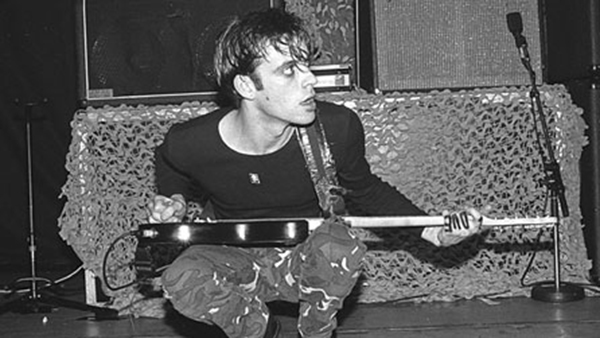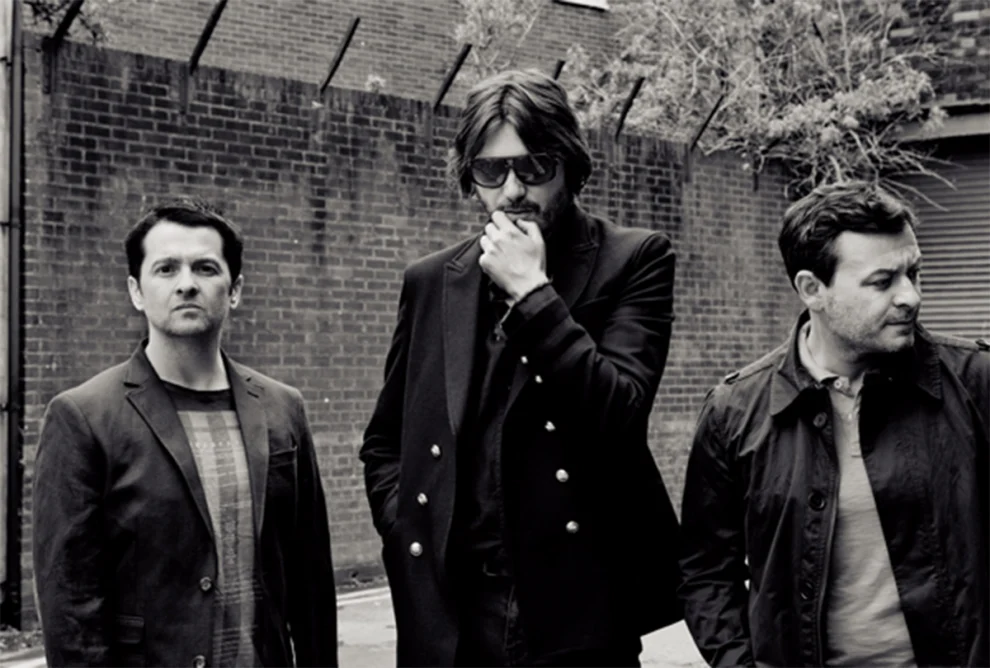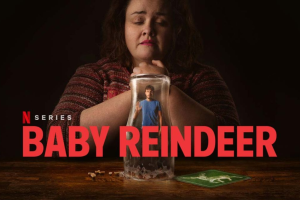ALONG with the Stereophonics, the Manic Street Preachers have carved out a hugely successful legacy, easily cementing themselves as one of Wales’ best musical acts.
Manic Street Preachers formed in 1986 at Oakdale Comprehensive School, Blackwood, South Wales, which all the band members attended.
Bradfield and the slightly older Moore are cousins, and shared bunk beds in the Bradfield family home after Moore’s parents divorced. During the band’s early years, Bradfield, alongside the classically trained Moore, primarily wrote the music while Wire focused on the lyrics.
The origin of the band’s name remains unclear, but the most often-told story relates that Bradfield while busking one day in Cardiff, got into an altercation with someone (sometimes said to be a homeless man) who asked him “What are you, boyo, some kind of manic street preacher?”
Original bassist Flicker (Miles Woodward) left the band in early 1988, reportedly because he believed that the band were moving away from their punk roots.
The band continued as a three-piece, with Wire switching from guitar to bass, and in 1988 they released their first single, “Suicide Alley”.
Despite its recording quality, this punk ode to youthful escape provides an early insight into both Bradfield’s guitar work and Moore’s live drumming, the latter of which would be absent from the band’s first LP.
The Manics intended to restore revolution to rock and roll at a time when Britain was dominated by shoegaze and acid house. The NME gave “Suicide Alley” an enthusiastic review, citing a press release by Richey Edwards: “We are as far away from anything in the ’80s as possible.”

After the release of “Suicide Alley,” Edwards joined the band on rhythm guitar and contributed to lyrics alongside Wire. Edwards also designed record sleeves and artwork and drove the band to and from gigs.
In 1990 the Manic Street Preachers signed a deal with label Damaged Goods Records for one EP. The four-track New Art Riot E.P. attracted as much media interest for its attacks on fellow musicians as for the actual music.
With the help of Hall or Nothing management, the Manics signed to indie label Heavenly Records. The band recorded their first single for the label, entitled “Motown Junk”.
Their next single, “You Love Us”, sampled Krzysztof Penderecki’s “Threnody to the Victims of Hiroshima” as well as Iggy Pop. The video featured Nicky Wire in drag as Marilyn Monroe and contained visual references to the film Betty Blue and to Aleister Crowley.
In an interview with then-NME journalist Steve Lamacq, Edwards carved the phrase “4REAL” into his arm with a razor blade to prove their sincerity. He was taken to hospital and received seventeen stitches.
NME subsequently ran a full-page story on the incident, including a phone interview with Richey on his motivations for doing it.
A recording of the editorial meeting discussing whether or not they could publish the image was included as a b-side on the band’s 1992 charity single Theme from M.A.S.H. (Suicide Is Painless), featuring Lamacq, the then-editor of NME Danny Kelly and James Brown (who went on to edit Loaded and the British version of GQ).
As a result of their controversial behaviour, the Manics quickly became favourites of the British music press, which helped them build a rabidly dedicated following.
Columbia Records of Sony Music UK signed the band shortly afterwards and they began work on their debut album.
The band’s debut album, Generation Terrorists, was released in 1992 on the Columbia Records imprint. The liner notes contained a literary quote for each of the album’s eighteen songs and the album lasted just over seventy minutes.
The album’s lyrics are politicised like those of the Clash and Public Enemy, with the album’s songs regularly switching from a critical focus on global capitalism to more personal tales of despair and the struggles of youth.

About the musical style of the album Pitchfork writer Joe Tangari wrote that Generation Terrorists “walked a weird line between agit-punk, cock rock, romantic melodicism and glam, and was so obviously patterned after the Clash’s London Calling that it was actually kind of cute.”
The group’s second album, Gold Against the Soul, displayed a more commercial, grungy sound which served to alienate both fans and the band itself. It was released to mixed reviews but still performed well, reaching number eight in the UK album chart.
The album presents a different sound from their debut album, not only in terms of lyrics but in sound, the band privileged long guitar riffs, and the drums themselves feel more present and loud in the final mix of the album.
This sound would be abandoned in their next album and as for the nature of the lyrics they also changed, with Edwards and Wire eschewing their political fire for introspective melancholy.
According to AllMusic, the album “takes the hard rock inclinations of Generation Terrorists to an extreme.”
The group’s next album, The Holy Bible, was released in August to critical acclaim, but sold poorly.
The album displayed yet another musical and aesthetic change for the band, largely featuring army/navy uniforms.
Musically, The Holy Bible marks a shift from the modern rock sound of their first two albums, Generation Terrorists and Gold Against the Soul.
In addition to the album’s alternative rock sound the album incorporates various elements from other musical genres, such as hard rock, British punk, post-punk, new wave, industrial, art rock and gothic rock.
Edwards disappeared on February 1 1995, on the day when he and James Dean Bradfield were due to fly to the US on a promotional tour.
In the two weeks before his disappearance, Edwards withdrew £200 a day from his bank account, which totalled £2,800 by the day of the scheduled flight.
He checked out of the Embassy Hotel in Bayswater Road, London, at seven in the morning, and then drove to his apartment in Cardiff
In the two weeks that followed he was apparently spotted in the Newport passport office, and the Newport bus station.
On February 14, Edwards’ Vauxhall Cavalier received a parking ticket at the Severn View service station and on February 17, the vehicle was reported as abandoned. Police discovered the battery to be flat, with evidence that the car had been lived in.
Due to the service station’s proximity to the Severn Bridge (which has been a renowned suicide location in the past) it was widely believed that he took his own life by jumping from the bridge.
Many people who knew him, however, have said that he was never the type to contemplate suicide and he was quoted in 1994 as saying “In terms of the ‘S’ word, that does not enter my mind. And it never has done, in terms of an attempt. Because I am stronger than that. I might be a weak person, but I can take pain.”

Edwards was legally “presumed dead” in 2008, to enable his parents to administer his estate. The band continue to set up a microphone for Edwards at every live performance.
The first album without Edwards, Everything Must Go, was released on May 20 1996. The band had chosen to work with new producer Mike Hedges, mainly for his work on Siouxsie and the Banshees’ single “Swimming Horses” that Bradfield rated highly.
The album has sold over two million copies around the world, and it is still considered one of the finest releases of the decade.
This Is My Truth Tell Me Yours was the first number 1 of the band in the UK, remaining at the top of the albums chart for 3 weeks, selling 136,000 copies in the first week and spending a total of 74 weeks in the Album Chart.
With their fifth album, the group also had a No. 1 single, “If You Tolerate This Your Children Will Be Next”. The song’s theme is taken from the Spanish Civil War, and the idealism of Welsh volunteers who joined the left-wing International Brigades fighting for the Spanish Republic against Francisco Franco’s military rebels.
The song takes its name from a Republican poster of the time, displaying a photograph of a young child killed by the Nationalists under a sky of bombers with the stark warning “If you tolerate this, your children will be next” written at the bottom.
The band’s seventh studio album, Lifeblood, was released on November 1 2004 and reached No. 13 on the UK album chart. Critical response to the album was mixed.
The band’s eighth studio album, Send Away the Tigers, was released on May 7 2007 on Columbia Records. It entered the official UK album charts at No. 2. Critical response to the album was largely positive, with some critics hailing the album as the band’s best in a decade.
The ninth Manics album, Journal for Plague Lovers, was released on May 18 2009 and features lyrics left behind by Edwards. Wire commented in an interview that “there was a sense of responsibility to do his words justice.”
Over the last decade, Manics continue to have recorded new albums and performed around the world, with fans across the globe still supporting them to this very day.


















Add Comment